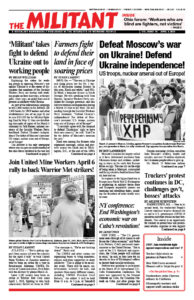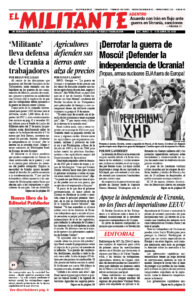PAVO, Ga. — “The war in Ukraine and rising prices are the No. 1 topics of discussion among farmers in this area, Black and white,” said Willie Head, a longtime farmer in South Georgia. He was speaking with Sam Manuel, Socialist Workers Party candidate for Georgia governor, and this Militant worker-correspondent during a March 14 visit to his farm. He was reading through the Socialist Workers Party statement, “Defend Ukraine’s independence! For defeat of Moscow’s invasion! U.S. troops, nuclear arms out of Europe, all of Europe!”
“I certainly agree with the demand to defend Ukrainians’ right to have their own country,” he said. “And I’m for the defeat of Moscow’s invasion for sure.”
Head was among the farmers who organized meetings, rallies and protests across the South and in Washington, D.C., at the end of the 1990s and into the 2000s to fight decadeslong discriminatory practices against Black farmers by the U.S. Department of Agriculture.
“The farmer knows what’s coming when oil prices go up,” he explained when we asked about the impact of Moscow’s war against Ukraine and rising inflation. “That means the prices of fuel, fertilizer, seed and everything else will go up. I just had to pay $435 for a hundred gallons of fuel. Last year it would have cost me half that. The fertilizer I use is $900 a ton this year — twice what it was in 2021. That’s what all of us are facing.”
Some types of fertilizer are up even higher. Anhydrous ammonia fertilizer is up more than 200% over last year. “American farmers are paying significantly higher prices for their weed-killing chemicals, crop seeds, fertilizer, equipment repairs and seasonal labor,” the Wall Street Journal reported Feb. 15.
Head farms corn, soybeans, greens and other vegetables on his 140-acre farm in Brooks County here. He also has a small herd of cows and a few hogs.
“SWP members are discussing the party’s statement at demonstrations called by Ukrainians and others to protest the war,” said Manuel. “We’re talking with drivers at truck stops, workers on strike picket lines and on workers’ doorsteps, and with co-workers on the job. We also want to reach out to working farmers and discuss the statement with them.”
Head said he did have questions about the party’s third demand. “I do think the U.S. should do more to help the Ukrainian government, to close their air space to the Russian planes,” he said. “You can see that Putin doesn’t have the support of the Russian people in this war, that their military is starting to sputter.”
“Despite what the U.S. government says, their only interest in Ukraine is to strengthen their power and position as the main ‘European’ power, which they became coming out of World War II,” Manuel said. “They have already extended their military reach close to Russia’s borders. Workers here and worldwide need our own foreign policy, independent of the capitalists, to defend Ukraine’s sovereignty and the toilers’ interests worldwide. It’s a trap for us to support the U.S. capitalist rulers.”
“Farmers here are waiting now to see if the banks will approve our requests for loans this spring,” Head said. In January and February farmers talked to local banks and officers of the Farm Service Agency about loans. The FSA, part of the U.S. Department of Agriculture, administers USDA loans and other programs on a local level.
Crisis facing farmers
“Because of these higher costs,” he said, “there will be some farmers who are denied loans and won’t be able to plant this year. And those who do plant aren’t sure if they’ll get enough for their crops at the end of the season to cover their costs and pay back their loans.
“Farmers hope the government will provide some kind of subsidy to make up the difference, or at least help, because of the war and sharp rise in inflation,” Head said. “But there’s no guarantee that will happen. The suppliers who sell the farmer fertilizer, fuel and seeds know what they’ll get for their products, but the farmer never knows.
“Higher prices for everything farmers use also mean that working people will be paying more for food,” Head added. “That’s already happening, and they’ll blame the farmers for that, just like they will blame the truckers, who have to pay much more for fuel now, for the higher costs of everything that’s shipped by truck.
“I have a cousin in Charlotte, North Carolina, who drives a light-rail train there. He comes from down here. I was talking to him the other day and he asked me, ‘How are we going to feed ourselves if things keep going like this? What are we going to do in the cities?’”
Farmers all over the country are facing similar conditions to those in South Georgia. For example, net income for farmers in Kansas is estimated to fall 65% from a year ago, a Kansas State University study reports.
“That’s why I and the other SWP candidates around the country explain that workers and our unions need to forge an independent working-class movement to back small farmers in fighting for immediate government aid to fully cover farmers’ costs of production, including living expenses for themselves and their families,” Manuel said.
“We’re demanding no foreclosures and that the land needs to be nationalized to guarantee its use by those who live on it and farm,” he said. “The Cuban Revolution is a living example of what an alliance between workers and farmers means, that we defend each other and support each other.”
“I’ve been to Cuba and I was impressed with what they have done,” Head said.

